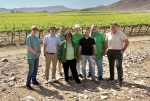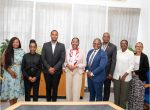Capricorn Group Limited has increased its value created in the Namibian economy by N$728 million to N$4.4 billion compared to the previous financial year, the Group has said in its annual financial results for the year ended 30 June 2023.
Of the total value created, 26.4% is represented by staff remuneration and benefits, 18.3% was paid to suppliers, and 22.6%, which amounts to N$1 billion, was contributed to the government in the form of direct and indirect taxes.
The Group experienced positive momentum, with revenue growth now exceeding pre-pandemic levels, indicating that the Group has moved past the recovery phase into the growth phase.
With the release of the results, Thinus Prinsloo, Group CEO, emphasised that the Group remains focused on working towards a sustainable future for the Group and its stakeholders. He said, “As responsible corporate leaders, we must challenge our relevance to stakeholders and continuously re-evaluate how we make an impact. I am pleased that our commitment to improving lives through leadership in financial services by being Connectors of Positive Change has impacted many lives positively this past financial year, resulting in value creation of note for all our stakeholders.”
Capricorn Group’s profit after tax increased by 28.7% to N$1.47 billion on the back of improved net interest margins, reduced credit impairment losses, strong growth in non-interest income and efficient operations.
Capricorn Group Chief Financial Officer Johan Maass said, “The increased injection into the economies of the countries in which we operate can largely be attributed to the satisfactory growth of the banking subsidiaries as the banking sector continued its recovery post-COVID-19, an improvement in net-interest income largely due to the endowment effect of higher interest rates, a growing loan book and prudent cost of funding management. We have also experienced lower credit impairment charges on the back of an improving operating environment and prudent and proactive credit risk management.”
He also indicated that further economic recovery would occur. “We expect further economic recovery and improved operating conditions in our region in the medium to long term. Namibia and Botswana have exciting prospects, some linked to natural resources and others to developing industries, including agriculture, logistics, manufacturing, and tourism,” he concluded.
The four main pillars of the Group’s business are earnings quality, credit quality, liquidity, and capital depth. The performance of the Group is evaluated on these four pillars.
The Group’s net interest income before impairments increased by 16.3% to N$2.72 billion (2022: N$2.38 billion), mainly attributable to the net-interest income of Bank Windhoek increasing by 17.8% following a series of interest rate increases totaling 300 basis points over the financial year. As a result of effective cost of funding management, Bank Windhoek’s cost of funding only increased by 208 basis points over the financial year.
Bank Gaborone’s net interest income increased by 12.0% off the back of loan book growth of 10.4%, while their net interest margin improved from 2.91% to 3.81% following an effective asset repricing strategy and effective cost of funding management in a volatile market.
Non-interest income increased by 13.1% to N$1.89 billion (2021: N$1.67 billion), mainly driven by transaction-based fee income increasing by N$197.8 million (18.2%) mainly as a result of higher transactional volumes, particularly through electronic channels. Non-interest income was significantly bolstered by diversified income streams, including asset management fee income of N$187.3 million (2022: N$164.6 million) and net insurance premium income of N$179.1 million (2022: N$161.3 million).
The Group’s operating expenses increased by 14.7%, which is higher than inflation. These increases relate to a normalisation of operational activity post-COVID-19, including increased spending on marketing, travel and training. Staff cost is the largest component of our operating expenses. During the pandemic, the Group did not fill vacancies, barring critical appointments. This policy has since been lifted, while new skills were required to fulfill the Group’s digitalisation drive. We, nevertheless, improved our cost-to-income ratio to 50.8% (2022: 51.1%).
The Group has well-developed capabilities in protecting asset quality. As the economy continued to recover in 2023, the Group experienced lower level of non-performing loans (NPLs). NPLs (excluding interest in suspense) decreased to N$2.10 billion (2022: N$2.13 billion). This resulted in the NPL ratio, excluding interest in suspense, decreasing to 4.5% (2022: 4.8%) and the credit loss ratio reducing from 0.85% to 0.51% year-on-year.
Gross loans and advances increased by 5.2% to N$47.2 billion this year. This growth can be attributed to growth in term loans, residential mortgages and article finance.
The Group declared a final dividend of 61 cents per ordinary share, which will be paid to shareholders on 20 October 2023. Including the interim dividend of 39 cents per ordinary share, this represents a total dividend of 100 cents per ordinary share (2022: 72 cents). This is a 38.9% increase in the total dividend per share for 2022. The Group continues to balance offering attractive returns for shareholders with retaining capital to drive growth and diversification.
“I also thank our loyal clients, partners, and suppliers for the value they add to our business and, consequently, the value we can create for all our stakeholders. Thank you for contributing to the socio-economic development of Namibia and Botswana. Let us continue together to make a difference in the development of our country,” concluded Thinus Prinsloo.










